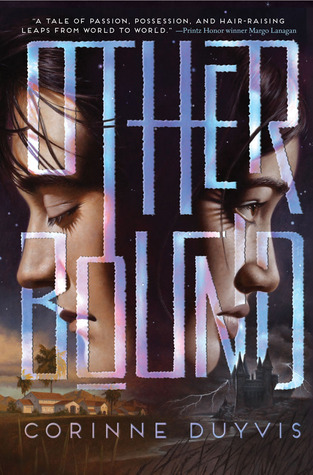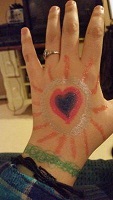 Book: Otherbound
Book: Otherbound
Author: Corinne Duyvis
Trigger warnings: Abuse (physical, emotional, verbal, mental), Swearing (minimal), self-harm, suicide (attempted), Alcoholism, mutilation, vomit|(if you spotted any I missed please let me know so I can add them, thanks)
Age: Young Adult
Sub-genre: Urban/otherworld fantasy
Page Count: 387
Points of Diversity: people of color, poverty/lower class, disabilities, queer people, queer people of color, disabled people of color, women of color
Intersectional Diversity?: yes
Would Recommend?: yes, highly
I picked up Otherbound for my first DiFR review because it recently won the Bisexual Book Award for speculative fiction from The Bi Writers Association. As a bisexual person myself, I have been frustrated with the lack of representation bi people receive. As such, I felt that the winner of such an award would be the best place to start for this blog.
I first came across the book a few weeks ago while browsing Goodreads for stories with diverse protagonists. The description didn’t interest me, most fantasy that involves people from earth doesn’t, so I passed it up. As such, I’m glad Otherbound won the award. If it hadn’t might never have picked the thing up.
Otherbound has a cast that is mostly people of color. The main character on Earth, Nolan, is an amputee with a prosthetic leg who lives with a poor family. He is diagnosed with epileptic seizures and hallucinations due to his uncontrollable possession of Amara. However, the book makes it clear that he has none of these. What he is experiencing is very different, but close enough that it’s understandable why doctors and parents would latch onto it as an explanation. Nolan has been keeping journals of what he sees through Amara’s eyes, hoping to figure out why he has this connection with her and how to break free of it.
Amara, in her own world, Is a mute servant who communicates through sign language. She also suffers severe physical and emotional abuse at the hands of the mage in their group Jorn. It is up to Amara, Jorn, and Maart (another mute servant and Amara’s lover) to protect Princess Cilla from the murderous ministers who took over her family’s throne. sadly, having a princess around doesn’t stop Jorn from keeping control of the group through emotional abuse and fear tactics.
The book turned out to be far more fascinating than I initially gave it credit for, with a unique magic system that comes with dire consequences when abused. As a writer myself, I loved seeing the plethora of new ideas, or at least new to me, presented in this story.
Now confession time. If it weren’t for the fact that I had decided to review this book, I would have most likely given up on it about halfway through. Now that’s not a criticism of Otherbound in this case. It’s a self admonition over just how jaded I’ve become when it comes to stories. You see, I don’t handle character death well. I’ve been hurt too many times by the poor handling of it in past. So I have a tendency to assume the worst whenever the reaper comes knocking on my book cover.
*SPOILER WARNING*
That’s what I did when Amara’s lover, Maart, was killed while trying to protect her from Jorn’s abuse. “Of course they killed him.” I thought. “had to make room for her to have a relationship with the princess she was making googly eyes at earlier. Just had to choose the easy way out of that love triangle didn’t you?” (not that I wanted a love triangle. *shudders*) I was especially mad because I had seen it coming from the beginning and had been hoping it wouldn’t happen. So when it did the book was promptly thrown to the floor in my rage.
But as it turns out my fears and anger were unfounded in this case and I wish I hadn’t been so quick to judge. Maart’s death actually had meaning, it had an impact. It provided the motivation Amara and Cilla needed to make their escape from Jorn. Amara is torn up with guilt over the fact that it took the death of the man she loves to finally spur her on. While, yes, she does get together with Cilla in the end, it doesn’t change the fact that she still grieves for and misses Maart dearly. He is remembered throughout the story, all the way to the last chapter. Something which I rarely come across in the books I’ve encountered.
Perhaps the only complaint I find myself left with about Maart’s death is the plot armor aspect. His death came soon after Amara was severely injured with deep cuts on her abdomen and elsewhere. She had temporarily lost her healing powers but still survived. I know blows to the head are serious business. But I could still feel the plot armor that Amara was wearing when I compare how dramatic her injuries came off as vs. what, in Maart’s case, sounded like a mere bump. However, that’s a minor point compared to everything else and could have easily been fixed by providing a better, more detailed description of the head blow Maart received.
The other big issue I had with the book was the basic premise that it turns out Amara isn’t a mage and that the only reason she has any powers at all is because of Nolan’s possession of her. This fact made me feel like the primary female hero had no power of her own and that any purpose she did have was solely through him and his presence. At first I felt like she was secondary to that of a man from another world. This really bothered me because of how often women are treated like second bananas to men in the real world.
The thing is this issue was also addressed and very well. Nolan does everything he can to be respectful of Amara, especially considering his lack of control. Yes her healing is dependent on him. But a major theme of the story is her learning to take power for herself. She learns to take charge of her own life and make choices based on what she wants, rather than on what others want from her. I see this as a powerful and necessary message. Especially today, where a corporate run world teaches us that taking any time out for ourselves and our own betterment is selfish and wrong. The truth is, doing such is vital if we are to have any hope of living a fulfilling and happy life.
*END SPOILERS*
In summation, this book comes highly recommended from me. The initial problems I had were all addressed. Whatever problems I initially had were dealt with and, in the end, I didn’t feel like anything was lacking or missing. Beyond that it was very enjoyable to read. In the end though, my biggest reason for recommending this book is that it helped me become a little less jaded and to have a little more faith in the works I pick up.



